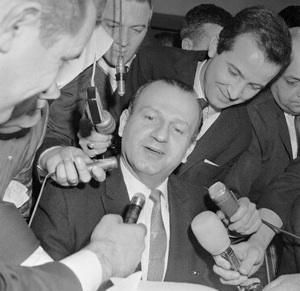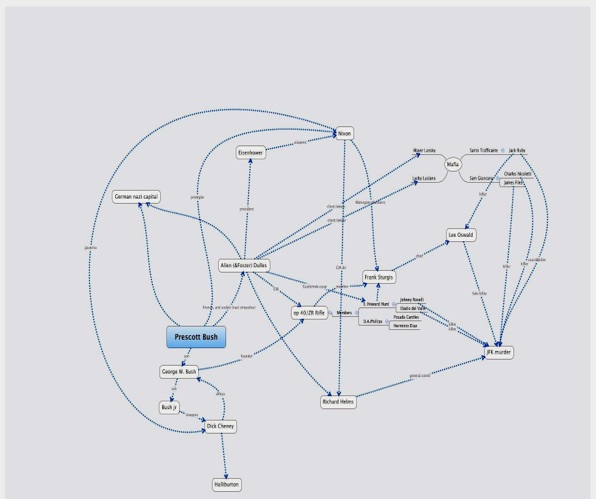Complotti?

USA, Assassinio Kennedy
In tutte le storie poliziesche per bene ci devono essere:
-il movente
-il colpevole/esecutore e/o
-il colpevole/mandante
-le modalità di esecuzione provate e ben attribuibili.
La storia ufficiale non risponde neanche ad uno di questi requisiti, neppure da lontano.
E questo per quanto riguarda JFK.
Se aggiungiamo il fratello Bob le spiegazioni ufficiali sono totalmente inadeguate, se non praticamente assenti.
In compenso ci sono spiegazioni alternative che rispondono in maniera che sembra convincente ai requisiti necessari, e convergono nei punti sostanziali.
Le fonti che appaiono più attendibili sono 3:
-
-due siti WEB che raccolgono una documentazione imponente e minuziosa insieme, e smontano totalmente la versione ufficiale e le sue varianti (uno dell’olandese sotto citato, che ha anche pubblicato due libri, e uno di Mary Ferrell.).
-
- il libro/indagine di un olandese (Wim Dankbaar) che ha assoldato agenti FBI in pensione, col DVD di interviste (compresa quella ad uno degli assassini-confesso)
-
-il libro di una giornalista (Claudia Furiati) che intervista l’ex capo dei servizi segreti cubani (Fabian Escalante).
Perché sono attendibili?
-
-per la ricchezza di informazioni dettagliate e logicamente consistenti
-
-per la presenza di un quadro convincente di moventi e mandanti
-
-per la coincidenza fra le diverse fonti sul quadro esecutivo di fondo.
Sintetizziamo i risultati:
--il modo: sia i filmati, sia le assurdità del ‘magic bullet’ sia l’analisi delle modalità di sparo di Oswald escludono che ci fosse un solo tiratore, ma almeno tre, uno dalla collinetta sul prato, uno di fronte (v. il film di Zapruder col balzo all’indietro dovuto al proiettile) e uno o due dai palazzi di fianco al deposito libri. Dove Oswald appare svolgere il ruolo di capro espiatorio (‘scapegoat’).
(Unendo testimonianze con prove e film risultano 4 colpi:
il 1°, laterale, che manca Kennedy e lascia una striscia sul prato oltre la strada (testimonianza polizia Dallas); il 2° che colpisce Kennedy da dietro (v. Zap: Kennedy che si accascia verso l’avanti con Jacqueline che va da lui); il 3° (v. Zap al rallentatore: direttamente non si nota) che colpisce Kennedy ancora da dietro (però senza molto attrito: c’é un lieve spostamento in avanti); il 4° (v. Zap) che colpisce Kennedy da destra/-avanti (la testa ha un balzo all’indietro e a sinistra) ed ha un forte impatto: é quello che rompe la calotta cranica e lascia per la strada pezzi di cranio e cervello.) (v. foto con grafico nel sito di Dankbaar.)
--gli esecutori: le fonti coincidono sulla gran parte dei nomi: il gruppo di fuoco del gruppo di cubani anticastristi addestrato dalla CIA in Florida (ZR Rifle o operazione 40, organizzata da G.Bush), con l’aggiunta di un paio di killer della mafia che avevano già collaborato con la CIA; con l’appoggio logistico e organizzativo della stessa CIA della base di Lake Ponchartrain e JM/Wave e della mafia del sud, capitanata da Sam Giancana e Santo Trafficante, luogotenenti di Lucky Luciano.
-gruppi di fuoco (2/3) con: Jack Ruby (mafia), Eladio (Yito) del Valle(?) (cubano addestrato CIA), Herminio Diaz(?) (cubano addestrato CIA), James Files (mafia, CIA), Charles Nicoletti (mafia), Marshall Caifano(?) (mafia), Johnny Roselli (mafia, cubani)
arma: Remington Fireball XP-100
-sul posto come supporto: Frank Sturgis (CIA), Dave Ferrie (CIA), E. Howard Hunt (CIA), Orlando Bosch (cubani, CIA), Chauncey Holt (CIA), Posada Carriles (cubani)
-coordinatori locali: David Atlee Phillips (CIA, poi capo emisfero occidentale), Edward Lansdale (militare/CIA), Santo Trafficante (mafia)
-coordinatore generale: Richard Helms (CIA, poi capo CIA)
--il movente: non può essere sul passato (il comportamento di Kennedy alla Baia dei Porci o altro può motivare odio, ma un omicidio politico si fa per qualcosa che il Presidente si accinge a fare o a bloccare...);
qui abbiamo 3 ipotesi:
-Allen Dulles appena licenziato dalla CIA (che vuole riprenderla..),
-il gruppo di influenti petrolieri e finanzieri di cui Lyndon Johnson é rappresentante nel governo (come Murchison e Hunt, che si riuniscono il giorno prima con Hoover, G.Bush, Nixon),
-il gruppo degli armamenti (il ‘complesso militare/industriale’ di cui parlava Eisenhower che si vedeva tagliato il budget e,
-last but non least, la mafia, che odiava JFK e il suo ministro della giustizia, Bob, che li stava tenendo sotto torchio. Mentre per il secondo gruppo c’é già un presidente alternativo disponibile, il primo e il terzo possono fare riferimento a Nixon (che fra l’altro ha anche legami diretti con alcuni degli esecutori, ed è un protegée, un accolito diremmo, della famiglia Bush).
Il gruppo degli esecutori é un chiaro indicatore di chi era coinvolto e aveva pianificato, ma, nonostante l’alto livello di alcuni, rimane in parte nell’ombra il livello superiore.
I nomi indicati da Dankbaar però sono indicativi:
“Now if you want to put faces to these devils of power, you could best divide them first into a 3 level hierarchy. High level, mid level and operational level. The high level is the select group of conspirators, you may think of Lyndon Johnson, J. Edgar Hoover, George and Prescott Bush, Allen Dulles, oil barons Clint Murchison and H. L. Hunt, crime bosses Santo Trafficante, Sam Giancana and Carlos Marcello.”
ma guardate attentamente il film di Zapruder e confrontatelo con la versione ufficiale: ‘un solo killer, una sola pallottola da dietro...’
v. anche
lunedì 5 novembre 2012


E dopo aver visto l’assassinio di JFK e il suo meccanismo, qualcuno può ancora credere seriamente all’uccisione del fratello Bob da parte di un improbabile iraniano isolato?
Fra l’altro, il fatto stesso che i due fratelli siano stati assassinati é prova lampante di un complotto. Nessun bookmaker accetterebbe una scommessa sul fatto che i due omicidi siano stati entrambi a)commessi, b) da individui isolati, c) senza nessuna relazione tra di loro: molti giornalisti non conoscono le leggi della probabilità...ma loro sì.
È lo stesso Bobby il primo ad essere convinto del complotto:
On Friday, Nov. 22, 1963, Robert F. Kennedy—J.F.K.'s younger brother, Attorney General and devoted watchman—was eating lunch at Hickory Hill, his Virginia home, when he got the news from Dallas. It was his archenemy, FBI chief J. Edgar Hoover, of all people, who phoned to tell him. "The President's been shot," Hoover curtly said. Bobby later recalled, "I think he told me with pleasure."
For the rest of the day and night, Bobby Kennedy would wrestle with his howling grief while using whatever power was still left him to figure out what really happened in Dallas—before the new Administration settled firmly into place under the command of another political enemy, Lyndon Johnson. While the Attorney General's aides summoned federal Marshals to surround R.F.K.'s estate (they no longer trusted the Secret Service or the FBI)—uncertain of whether the President's brother would be the next target—Bobby feverishly gathered information. He worked the phones at Hickory Hill, talking to people who had been in the presidential motorcade; he conferred with a succession of government officials and aides while waiting for Air Force One to return with the body of his brother; he accompanied his brother's remains to the autopsy at Bethesda Naval Hospital, where he took steps to take control of medical evidence, including the President's brain; and he stayed coiled and awake in the White House until early the next morning. Lit up with the clarity of shock, the electricity of adrenaline, he constructed the outlines of the crime. Bobby Kennedy would become America's first J.F.K. assassination-conspiracy theorist.
The President's brother quickly concluded that Lee Harvey Oswald, the accused assassin, had not acted alone. And Bobby immediately suspected the CIA's secret war on Fidel Castro as the source of the plot. At his home that Friday afternoon, Bobby confronted CIA Director John McCone, asking him point-blank whether the agency had killed J.F.K. (McCone denied it.) Later, R.F.K. ordered aides to explore a possible Mafia connection to the crime. And in a revealing phone conversation with Harry Ruiz-Williams, a trusted friend in the anti-Castro movement, Kennedy said bluntly, "One of your guys did it." Though the CIA and the FBI were already working strenuously to portray Oswald as a communist agent, Bobby Kennedy rejected this view. Instead, he concluded Oswald was a member of the shadowy operation that was seeking to overthrow Castro.
Bobby knew that a dark alliance—the CIA, the Mafia and militant Cuban exiles—had formed to assassinate Castro and force a regime change in Havana. That's because President Kennedy had given his brother the Cuban portfolio after the CIA's Bay of Pigs fiasco. But Bobby, who would begin some days by dropping by the CIA's headquarters in Langley, Va., on his way to the Justice Department, never managed to get fully in control of the agency's sprawling, covert war on Castro. Now, he suspected, this underground world—where J.F.K. was despised for betraying the anti-Castro cause—had spawned his brother's assassination.
As Kennedy slowly emerged from his torment over Dallas and resumed an active role in public life—running for U.S. Senator from New York in 1964 and then President in 1968—he secretly investigated his brother's assassination. He traveled to Mexico City, where he gathered information about Oswald's mysterious trip there before Dallas. He met with conspiracy researcher Penn Jones Jr., a crusading Texas newspaperman, in his Senate office. He returned to the Justice Department with his ace investigator Walter Sheridan to paw through old files. He dispatched trusted associates to New Orleans to report to him on prosecutor Jim Garrison's controversial reopening of the case. Kennedy told confidants that he himself would reopen the investigation into the assassination if he won the presidency, believing it would take the full powers of the office to do so. As Kennedy adviser Arthur Schlesinger Jr. once observed, no one of his era knew more than Bobby about "the underground streams through which so much of the actuality of American power darkly coursed: the FBI, CIA, the racketeering unions and the Mob." But when it came to his brother's murder, Bobby never got a chance to prove his case.
Il mio molto personale parere é che (come in altri complotti) la posizione di almeno una parte dei complottisti di alto livello sia stata passiva: saputo dell’iniziativa che si preparava (mafia+cubani) ha lasciato fare ed agevolato; per altri si é trattato forse di qualcosa di più, cioé un vero e proprio via libera. Per altri ancora..di più ancora.
Dall’albero delle relazioni successive, che mostra alcuni dei lehami fra i protagonisti di quegli anni, si vede però che sicuramente Allen Dulles non può essere estraneo. (Due degli organizzatori sono gli stessi che hanno organizzato per lui il colpo in Guatemala nel ’54). Fa parte o é legato a tutti i gruppi coinvolti (petrolieri e finanziatori di Op40 inclusi).

Jack Ruby che dice: la verità é grossa ma..impediranno di dirla